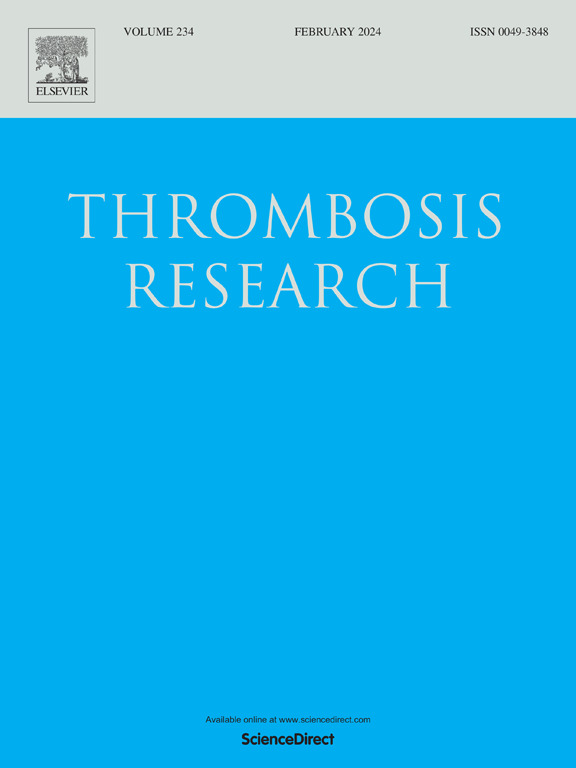Warfarin reduces circulating white blood cell count: Post-hoc analysis of two randomized trials
IF 3.4
3区 医学
Q1 HEMATOLOGY
引用次数: 0
Abstract
Warfarin is a widely used vitamin K antagonist (VKA) with known pleiotropic effects beyond anticoagulation. Preclinical and case-control evidence suggests that warfarin may affect hematopoiesis, but longitudinal human evidence is lacking. To explore this potential effect, we conducted a post-hoc analysis of participants in the Hokusai-VTE and ENGAGE AF-TIMI 48 trials, which randomized patients to warfarin or the direct oral anticoagulant edoxaban with routine laboratory testing at predefined follow-up visits. We analyzed changes in total circulating white blood cells (WBC) and subpopulations (lymphocytes, monocytes, granulocytes) using linear regression and mixed-effects models, adjusting for baseline counts, age, sex, and time. Among 23,618 patients enrolled in the two phase 3 trials, warfarin use was associated with a modest but statistically significant reduction in WBC count (−2.3 %, 95 % CI −2.9 % to −1.7 %) and granulocyte count (−3.6 %, 95 % CI −4.5 % to −2.7 %) compared with edoxaban, while lymphocyte and monocyte counts did not differ. The associations remained consistent across multiple sensitivity analyses. No increase in clinically relevant granulocytopenia was observed. In the context of two large randomized trials, these findings support a subtle hematologic effect of warfarin, particularly in granulocytes, that aligns with preclinical findings and warrants further investigation into the long-term impact of VKAs on hematopoiesis.
华法林降低循环白细胞计数:两个随机试验的事后分析
华法林是一种广泛使用的维生素K拮抗剂(VKA),已知具有抗凝血以外的多效作用。临床前和病例对照证据表明华法林可能影响造血,但缺乏纵向的人体证据。为了探索这种潜在的影响,我们对Hokusai-VTE和ENGAGE AF-TIMI 48项试验的参与者进行了事后分析,这些试验将患者随机分配到华法林或直接口服抗凝剂依多沙班,并在预定的随访中进行常规实验室检测。我们使用线性回归和混合效应模型分析了总循环白细胞(WBC)和亚群(淋巴细胞、单核细胞、粒细胞)的变化,调整了基线计数、年龄、性别和时间。在两项3期试验的23,618例患者中,与依多沙班相比,华法林的使用与WBC计数(- 2.3%,95% CI - 2.9%至- 1.7%)和粒细胞计数(- 3.6%,95% CI - 4.5%至- 2.7%)的适度但有统计学意义的降低相关,而淋巴细胞和单核细胞计数没有差异。这些关联在多个敏感性分析中保持一致。临床相关粒细胞减少未见增加。在两项大型随机试验的背景下,这些发现支持华法林微妙的血液学作用,特别是在粒细胞中,这与临床前研究结果一致,值得进一步研究vka对造血的长期影响。
本文章由计算机程序翻译,如有差异,请以英文原文为准。
求助全文
约1分钟内获得全文
求助全文
来源期刊

Thrombosis research
医学-外周血管病
CiteScore
14.60
自引率
4.00%
发文量
364
审稿时长
31 days
期刊介绍:
Thrombosis Research is an international journal dedicated to the swift dissemination of new information on thrombosis, hemostasis, and vascular biology, aimed at advancing both science and clinical care. The journal publishes peer-reviewed original research, reviews, editorials, opinions, and critiques, covering both basic and clinical studies. Priority is given to research that promises novel approaches in the diagnosis, therapy, prognosis, and prevention of thrombotic and hemorrhagic diseases.
 求助内容:
求助内容: 应助结果提醒方式:
应助结果提醒方式:


